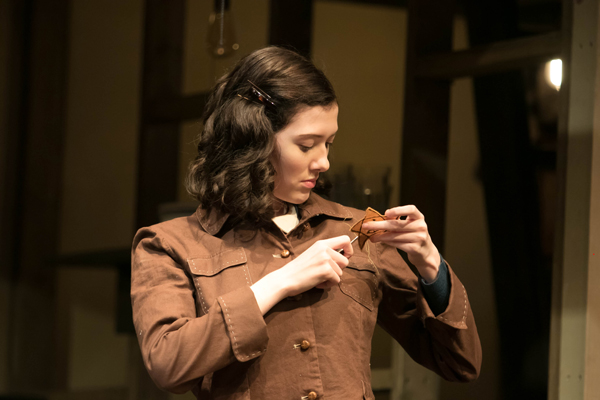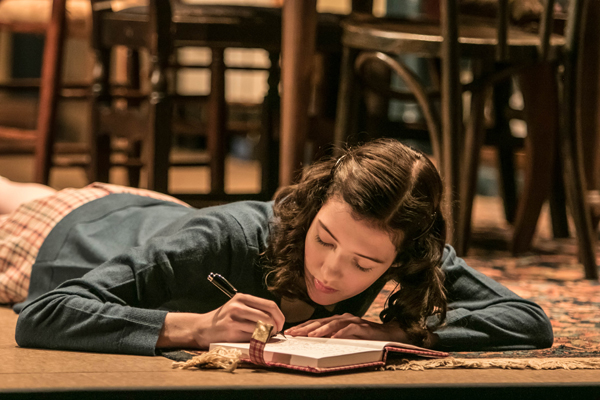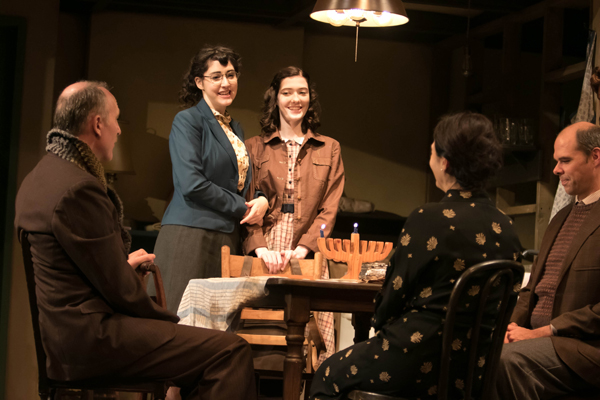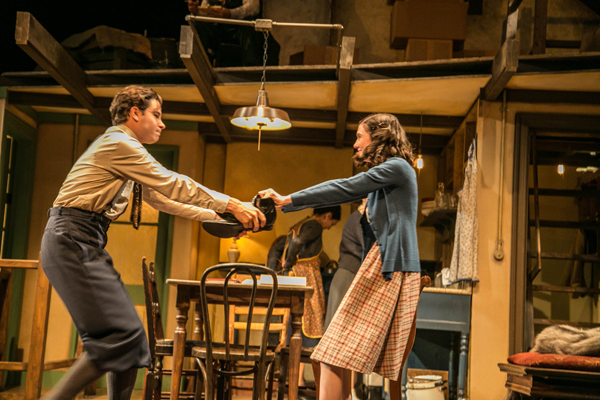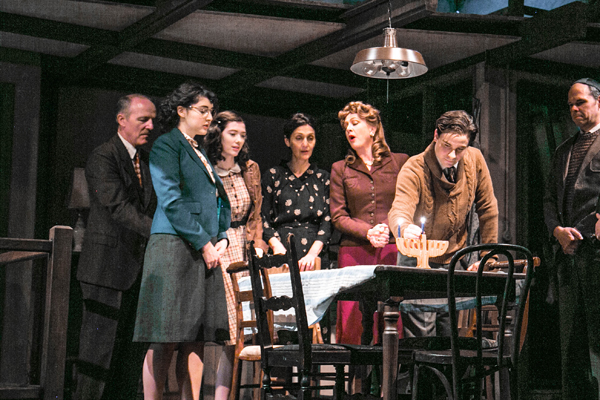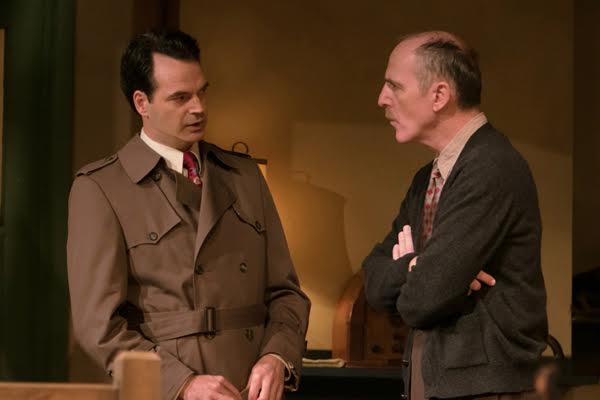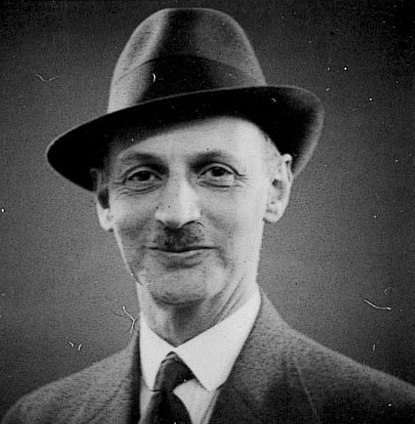“Still, when the script offers its quiet sections...the cast, directed by Joseph Discher, is at its most alive.”
“Joseph Discher directs with sensitivity and a steady hand...”
By Frances Goodrich and Albert Hackett
Adapted by Wendy Kesselman
Directed by Joseph Discher
Scenic Design by Brittany Vasta
Lighting Design by Matthew Adelson
Costume Design by Candida Nichols
Sound Design by Steven L. Beckel
Production Stage Manager - Denise Cardarelli*
THE CAST
Jacqueline Antaramian* | Edith Frank
Anthony Cochrane* | Mr. Van Daan
Michael Lee Cook | Mr. Kraler
Lauriel Friedman | Margot Frank
Mathias Goldstein | First Man
Carol Halstead* | Mrs. Van Daan
Sean Hudock* | Peter Van Daan
Bryan Scott Johnson* | Otto Frank
Emmanuelle Nadeau* | Anne Frank
Jackson Knight Pierce | Second Man
Nick Clark Tanner | Third Man
Patrick Toon* | Mr. Dussel
Shana Wiersum | Miep Gies
*member Actor's Equity
THE DIARY OF ANNE FRANK TIMELINE
June 12, 1929 - Anneliese Marie Frank (Anne) is born I Frankfurt, Germany.
January 30, 1933 - Hitler becomes Chancellor of Germany.
April 1, 1933 - Nazi Boycott of Jewish owned shops begins in Germany.
January 1934 - Otto Frank begins working at Opekta in Amsterdam.
February 1934 - Edith, Margot and Anne leave Germany and join Otto in Amsterdam.
August 19, 1934 - Adolf Hitler becomes Fuhrer of Germany.
November 9-10, 1938 - Kristallnacht (The Night of Broken Glass). German citizens loot and burn 7,000 Jewish businesses, homes, and synagogues. 30,000 Jews are arrested and sent to concentration camps.
September 1, 1939 - Germany invades Poland.
September 3, 1939 - Britain, France, Austria, and New Zealand declare war on Germany.
May 10, 1940 - The Germans invade and occupy the Netherlands. The Germans order that Jewish children can only attend Jewish schools.
May 31, 1940 - Signs bearing the words "Jewish business" must be affixed outside the relevant shops and offices.
October 20, 1940 - All Dutch government officials must sign an affidavit that neither he, his wife, or any of his/her relatives are Jewish. All Dutch businesses owned or operated by Jews, or in which Jews have a financial interest, must register with German authorities.
January 10, 1941 - All Jews residing in Holland must register with German authorities. Failure to do so is punishable by 5 years in prison or confiscation of property, or both.
November 27, 1941 - While working in the vicinity of Amsterdam, Jews must travel by foot; when distances of more than 10 km are involved, the use of a train would be allowed "in certain circumstances."
December 7, 1941 - The Japanese attack Pearl Harbor. War is declared on the U.S.
May 3, 1942 - Jews must wear a yellow star with the word "Jew" printed on it. They must observe a curfew between 8PM and 6AM and are allowed to shop only between 3PM and 5PM. Public transportation is forbidden for Jews. Telephones are forbidden to Jews. Jews are forbidden to enter the homes of non-Jews. The German government is authorized to confiscate all Jewish property except for wedding rings and gold teeth.
July 5, 1942 - Anne's older sister Margot is ordered to report for relocation to a labor camp. The Frank family goes into hiding the next day.
July 15, 1942 - Deportations of Jews out of Holland begins.
November 16, 1942 - Fritz Pfeffer (Dussel), a dentist and friend of the family, joins the annex.
February, 1943 - The Germans surrender in the battle of Stalingrad and Germany starts retreating.
June 6, 1944 - Western Allied Forces invade Normandy. D-Day.
August 4, 1944 - The residents of the Secret Annex are betrayed and arrested. They are taken to a police station and eventually to Westerbork transit camp.
"It's a wonder I haven't abandoned all my ideals, they seem so absurd and impractical. Yet I cling to them because I still believe, in spite of everything, that people are truly good at heart. It's utterly impossible for me to build my life on a foundation of chaos, suffering and death. I see the world being slowly transformed into a wilderness, I hear the approaching thunder that, one day, will destroy us too, I feel the suffering of millions. And yet, when I look up at the sky, I somehow feel that everything will change for the better, that this cruelty too shall end, that peace and tranquility will return once more..."
Anne Frank wrote this twenty days before she and the residents of the "Secret Annex" at 263 Prinsengracht were taken by the Nazis. The eight souls in hiding had survived over two years in the midst of horrific and terrifying circumstances while maintaining some of the noblest human attributes: not the least of which is holding on to hope in the face of fear.
Anne Frank at her writing desk
It has been an honor to help bring the story of Anne Frank to the stage, but I struggled over how I wanted to express my thoughts here regarding this production. How does one begin to write about the importance of Anne Frank's life? It seemed to me that any words I could string together would be insufficient. Then I remembered the simple message on a bookmark given to me during my visit to the Anne Frank Center in Manhattan: "Share Her Voice."
"Where there's hope, there's life. It fills us with fresh courage and makes us strong again."
Anne Frank had every reason to give up hope, but instead she looked at her life and the world around her and found a reason to go on. Her ability to elevate herself above her own situation and to find perspective and purpose in the midst of suffering is profound and inspiring.
"I want to be useful and bring enjoyment to all people, even those I've never met. I want to go on living, even after my death!"
She did not allow herself to stop being part of the world, even while in hiding. Her message is simple, strong, and very useful.
"How wonderful it is that nobody need wait a single moment before starting to improve the world."
Otto Frank
On January 27, 2945 Otto Frank was liberated from Auschwitz by the Russian army. He was taken first to Odessa and then to France before being allowed to make his way back to Amsterdam. On July 18 of that same year, he received a letter informing him that his daughters died at Bergen-Belsen. That very day, Miep Gies gave him Anne's diary, which she had found in the Annex on the day the Franks were taken. The first 1500 copies of Anne's diary were published in Amsterdam in 1947. Since that time it has been translated into 67 languages, with over 30 million copies sold. Last year, over 1.2 million people visited the Anne Frank House in Amsterdam.
Despite the lessons learned from past atrocities, the world seems to forget somehow, and tragically, history repeats itself. We must never give up hope. In the face of atrocities committed around the globe and here in our own country we wonder how we can effect change, how we can help with such vast and terrible situations. There is a saying from the Talmud which is echoed in the play by Otto Frank. "He who saves a single life, saved the entire world." I can think of no better sentiment. We can start here. we can begin again every day by sharing Anne's voice.
I encourage you to learn more about Anne Frank by reading her diary, by visiting www.anne-frank.org or by going to the Anne Frank Center, 44 Park Place, New York, NY.
Share her voice.
Otto returns to the attic.
